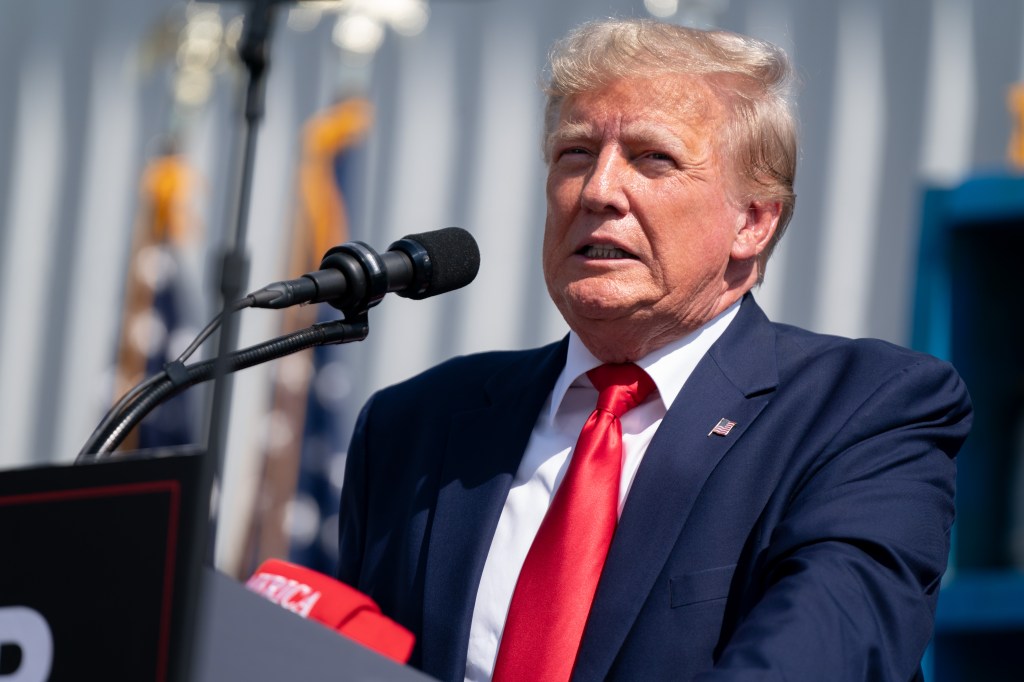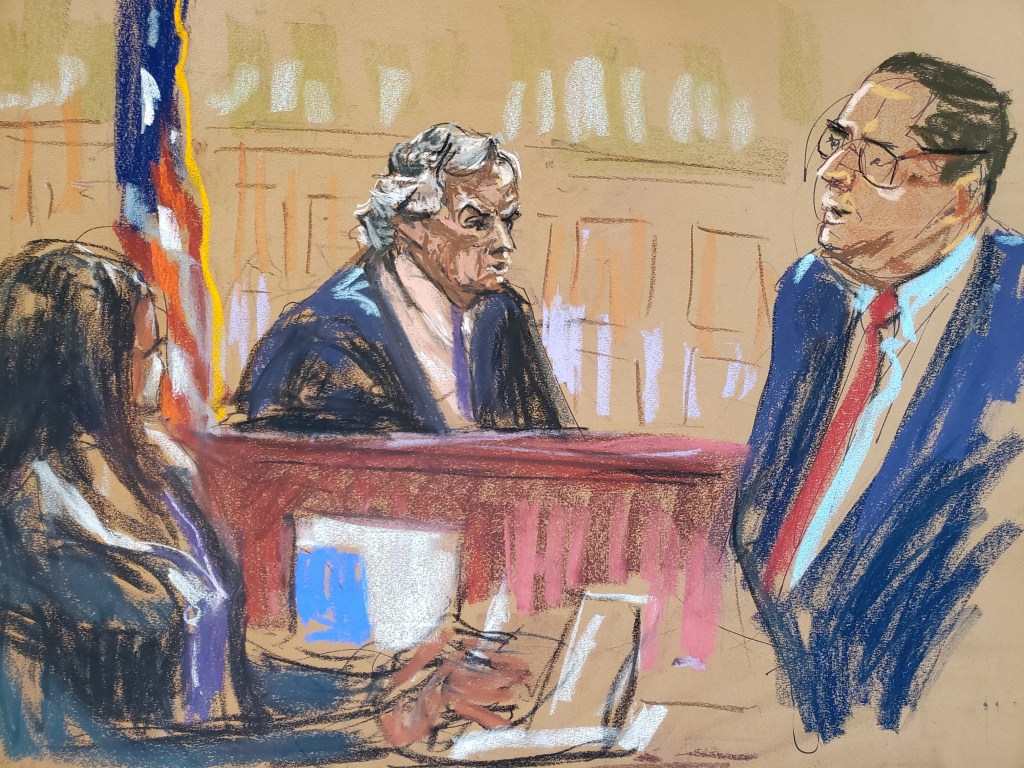Trump can’t get bond to appeal $454M civil fraud judgment after approaching 30 firms: lawyers
Donald Trump has failed to secure the massive $454 million bond in his New York civil fraud case despite approaching more than 30 firms, his lawyers said Monday — raising the chances that the state will move to seize some of his prized properties.
Trump, 77, refuses to sell off his properties since that kind of fire sale would result in brutal losses, his lawyers said in court papers.
And he faces “insurmountable difficulties” involving the other option: getting a lender to back the full amount he owes by March 25, his lawyers wrote, asking an appeals court to come to the ex-president’s rescue.
The real estate mogul is required to post the whopping sum as he fights the financially crushing ruling New York Attorney General Letitia James won at trial.
If the appeals court doesn’t step in to pause the deadline, James could come to collect — and she has previously indicated she’ll go after Trump’s landmark Big Apple properties.
“If he does not have funds to pay off the judgment, then we will seek judgment enforcement mechanisms in court, and we will ask the judge to seize his assets,” the Democrat told ABC News last month.
Legal experts said James could also go after other Trump properties outside of New York, such as Mar-a-Lago in Florida, and seize other types of assets such as bank accounts, wages, art, accounts receivable, rent on buildings and money-market accounts.
The AG “may file or request a property execution requesting that Trump property be seized and sold with the proceeds being used to pay off the judgment,” New York civil lawyer Imran Ansari said.
“I believe that the AG would be able to levy on any assets of Trump and the Trump Organization, including its many real estate holdings, both within the state and outside the state, including Mar-a-Lago,” Ansari said.
Here’s how Donald Trump’s NY fraud ruling impacts his businesses
The bombshell court ruling finding Donald Trump liable for fraud left even his own lawyers scratching their heads — asking the judge on Wednesday to clarify his decision canceling the former president’s New York business licenses.
Manhattan Supreme Court Justice Arthur Engoron’s 34-page ruling from Tuesday would force Trump, 77, to hand over control of his Empire State properties — including Trump Tower in Midtown — to an independent third party, otherwise known as a receiver.
In his ruling, the judge wrote the receiver must be appointed “to manage the dissolution of the cancelled” business certificates for limited liability corporations, or LLCs, under the Trump Organization umbrella.
Here’s how the ruling impacts Trump’s businesses, according to legal experts:
What are business certificates and what does it mean to have them revoked?
Business certificates are issued by the state to prove a company’s validity and are used for business transactions.
They can be thought of like a birth certificate for a person, former financial-crimes prosecutor Diana Florence told The Post.
When the judge canceled them, it was like being given “death certificates” — with the ruling amounting to a “corporate death penalty,” Florence said.
Judge revokes Trump’s NY business licenses, finds he committed fraud by inflating wealth
These certificates are required for entities like LLCs and come with privileges such as protecting personal assets if the company goes under, Cornell Law professor Robert Hockett said.
Hockett said a common but “unsavory business practice” is for a company to pretend it has more money than it really does in order to help it get an LLC certificate.
In this case, an LLC functions like a “shell” meant to “evade accountability.”
“What the judge found yesterday is that Trump is effectively doing this,” Hockett told The Post. “He’s been pretending many of these businesses of his are well capitalized and capable of paying their creditors — in effect doing good work that benefits the public and warrants the certifications of limited liability.”
READ MORE
Trump Organization general counsel Alan Garten wrote in court docs Monday that the presumptive 2024 Republican presidential nominee is “financially stable” and he still has “substantial assets.”
But because he won’t sell his properties — and backers won’t accept Trump using them as collateral to back the massive bond — Garten explained that there is a “major obstacle” to meeting the deadline.
Trump has reached out to 30 surety companies through four different brokers, and he’s spent “countless hours negotiating with one of the largest insurance companies in the world” — all with no success, the filing claims.
These companies also require roughly 120% of the judgment amount’s worth of collateral – or in this case $557 million, Trump’s lawyers wrote.
The companies charge 2% a year to back a bond, with two years upfront, totaling $18 million, which Trump wouldn’t get back even if he won the appeal, the filings claim.
The “actual amount of cash or cash equivalents required ‘to collateralize the bond and have sufficient capital to run the business and satisfy its other obligations’ approach[es] $1 billion,” according to the court docs.
Gary Guilietti, the president of insurance surety Lockton Companies who has been helping Trump’s efforts to get a bond, wrote in an affidavit: “While it is my understanding that the Trump Organization is in a strong liquidity position, it does not have $1 billion in cash or cash equivalents.”
“A bond of this size is rarely, if ever, seen. In the unusual circumstance that a bond of this size is issued, it is provided to the largest public companies in the world, not to individuals or privately held businesses,” he added.
In February, Manhattan Supreme Court Justice Arthur Engoron – who oversaw the three month trial against Trump and others – ordered the defendants to pay $464 million for his decade of exaggerating assets by billions a year on financial statements to get better loan and insurance terms.
Start your day with all you need to know
Morning Report delivers the latest news, videos, photos and more.
Thanks for signing up!
Trump has denied any wrongdoing and has sought to paint the trial as being part of a political witch hunt that a Democratic cabal is carrying out against him, led by President Biden.
James has opposed Trump’s bid to be allowed to post a $100 million bond instead, claiming he and his co-defendants “will attempt to evade enforcement of the judgment or to make enforcement more difficult.”
Trump’s attorneys have insisted a bond isn’t necessary because the former president is good for the money should he lose his appeal.
“Defendants’ real estate holdings — including iconic properties like 40 Wall Street, Doral Miami, and Mar-a-Lago, — greatly exceed the amount of the judgment,” the filing says. “Such assets are impossible to secrete or dispose of surreptitiously, leaving the plaintiff effectively secured during the pendency of an appeal.”
The state has rejected that argument, saying Trump could try to skirt the judgement later on if he isn’t forced to post a bond, and noting that his assets could fluctuate over time.
Trump’s lawyers asked the appeals court to hear oral arguments on the issue.
The request comes after Trump last week secured a $91.6 million bond to cover 110% of the judgement he owes in writer E. Jean Carroll’s defamation lawsuit.

















